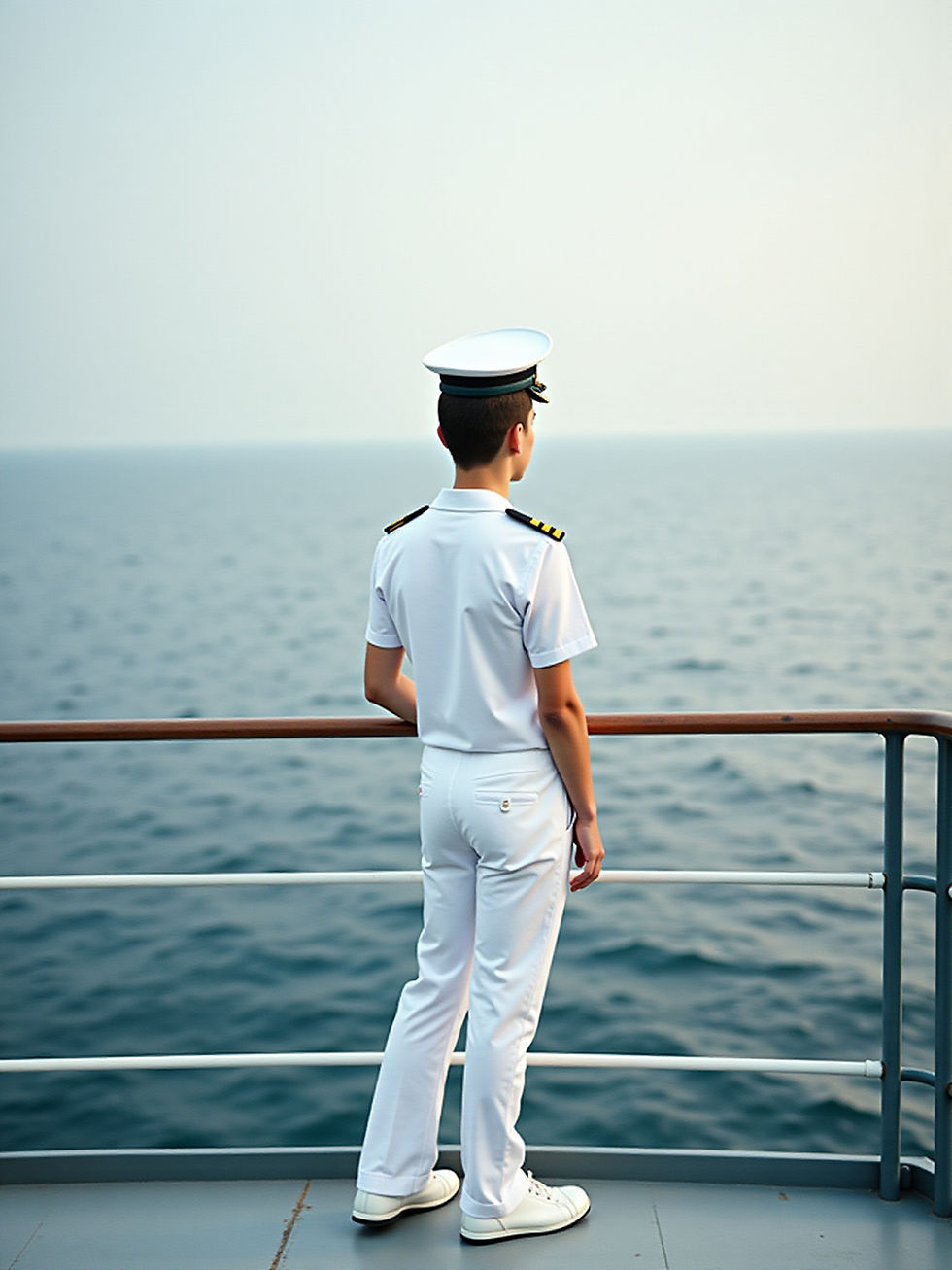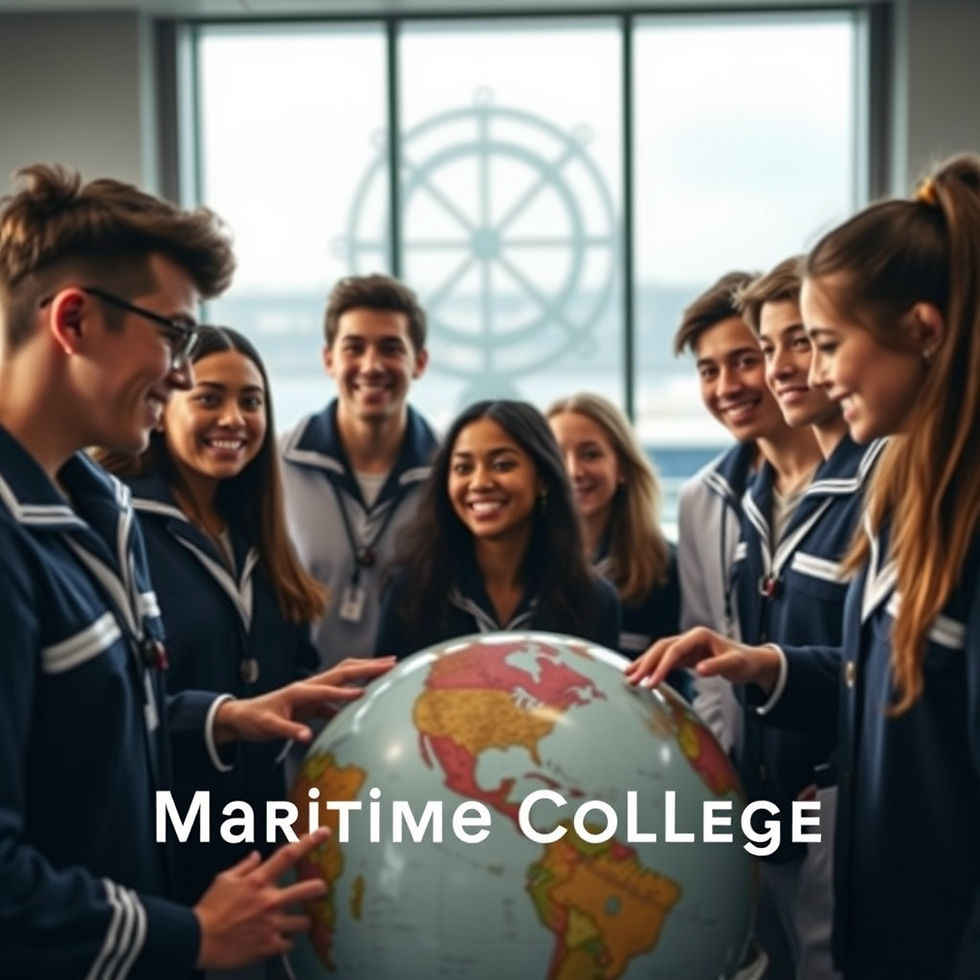Chart Your Course: How to Get a Job on a Cruise Ship – A Complete Guide for Deck Ratings, Engine Ratings, Cadets & Firefighters
- kousik pattanayak

- Jun 6, 2025
- 7 min read
Working on a cruise ship is more than just a job; it's an adventure, a chance to travel the world, meet diverse people, and build a rewarding career. For many, the dream of joining a cruise ship is fueled by the allure of competitive salaries and unparalleled career growth opportunities. Whether your ambition is to become a Deck Rating, an Engine Rating, an aspiring Cadet, or a vital member of the Firefighter Team, understanding the precise path—from required maritime studies to entrance exams, training duration, and the recruitment process—is absolutely essential.
This comprehensive guide will navigate you through every crucial step, ensuring you have all the information needed to launch your career at sea.
In this guide, we’ll dive deep into:
✅ Pre-maritime studies required for cruise ship jobs
✅ Eligibility criteria, crucial entrance exams & percentage requirements
✅ Detailed course duration & syllabus for essential maritime training
✅ Valuable internship opportunities with top cruise companies
✅ The complete recruitment process & expert selection tips

1. Your Gateway to the Seas: Diverse Career Paths on Cruise Ships
The maritime industry offers a variety of roles on a cruise ship, each vital to its smooth operation and passenger safety. Understanding these distinct pathways is your first step.
Deck Ratings: The Navigational Backbone
Role: Deck Ratings are the backbone of a ship's operations. They are instrumental in the safe navigation of the vessel, expertly handling cargo operations, and ensuring the pristine condition of the deck and superstructure maintenance. This role demands vigilance, discipline, and a strong understanding of ship procedures.
Required Training: To embark on this path, aspiring Deck Ratings must complete the GP Rating Course (General Purpose Rating). This comprehensive program provides foundational knowledge in both deck and engine duties, offering versatility.
Eligibility:
Academic: Successful completion of 10th or 12th Standard with a minimum aggregate of 40% marks.
Age: Candidates should be between 17 and 28 years of age.
Medical: Strict medical fitness standards apply, including eyesight of 6/6 (uncorrected or with correction) and no color blindness.
Engine Ratings: The Heartbeat of the Vessel
Role: Engine Ratings are crucial to the ship's mechanical integrity. They assist in engine room operations, performing vital machinery maintenance, and providing essential technical support to ensure all propulsion and auxiliary systems run efficiently.
Required Training: A specialized Marine Engineering Pre-Sea Training program is mandatory for this role, equipping candidates with the necessary mechanical and technical skills.
Eligibility:
Academic: A pass in 10th or 12th Standard with a minimum aggregate of 40% marks.
Technical: A basic knowledge of mechanical systems is highly advantageous and often required.
Cadet Program: Future Leaders of the Fleet (Deck & Engine Cadets)
Role: The Cadet Program serves as the entry-level officer training pathway, designed to groom future leaders and officers of the ship. Cadets undergo rigorous theoretical and practical training, preparing them for supervisory roles.
Required Training: Aspiring officers typically pursue a Diploma in Nautical Science (DNS) for Deck Cadets or a B.Tech Marine Engineering degree for Engine Cadets. These programs provide in-depth knowledge and hands-on experience.
Eligibility:
Academic: Completion of 10+2 (Physics, Chemistry, Mathematics) with a minimum aggregate of 60% marks.
Entrance Exam: Admission to these prestigious programs often requires clearing competitive entrance exams, such as the IMU CET (Indian Maritime University Common Entrance Test).
Firefighter Team: Onboard Guardians of Safety
Role: The Firefighter Team is a critical component of a cruise ship's safety apparatus. They are responsible for responding to onboard fire emergencies, conducting regular safety drills, and performing vital rescue operations. Their quick thinking and preparedness are paramount for passenger and crew safety.
Required Training: Candidates must complete the STCW Fire Prevention & Firefighting Course. This specialized training focuses on practical firefighting techniques and emergency response.
Eligibility:
Certification: Possession of a basic firefighting certification is usually required.
Physical: Exceptional physical fitness and proven emergency response training are essential for this demanding role.

2. Navigating the Academic Seas: Pre-Maritime Studies & Entrance Exams
Gaining admission to reputable maritime programs involves specific academic requirements and often, competitive entrance examinations.
IMU CET (Indian Maritime University Common Entrance Test)
Purpose: The IMU CET is a mandatory entrance examination for admission to highly sought-after degree programs like B.Tech Marine Engineering and B.Sc Nautical Science at various Indian Maritime University campuses and affiliated institutes.
Exam Notification: The official notification for the IMU CET is typically published every year in April-May on the IMU official website (imu.edu.in). Aspiring candidates should regularly check the website for updates.
Eligibility:
GP Rating Course Entrance Requirements
Purpose: The GP Rating Course provides entry-level maritime training for individuals aspiring to join as deck and engine crew roles. This course opens doors to a vast range of opportunities on various types of vessels, including cruise ships.
Eligibility:
Academic: Successful completion of 10th or 12th Standard with a minimum aggregate of 40% marks.
Age Limit: The age bracket for applicants is typically between 17.5 and 25 years.
Medical: Stringent medical fitness standards apply, including eyesight of 6/6 (uncorrected or with correction) and no color blindness.
Exam Notification: Unlike IMU CET, GP Rating Course entrance exams are usually conducted by individual shipping companies and maritime academies. It is advisable to visit the official website of the Directorate General of Shipping (DG Shipping) for a list of approved institutes and their respective admission processes.

3. Training Duration & Syllabus: Building Your Maritime Expertise
Once you meet the eligibility criteria, the next step is to undergo the specialized training required for your chosen path.
GP Rating Course
Duration: This intensive program typically spans 6 months. Syllabus: The curriculum covers a wide range of essential maritime skills, including Seamanship & Navigation Basics, comprehensive modules on Ship Safety & Emergency Procedures, and practical training in Cargo Handling & Maintenance.
Diploma in Nautical Science (DNS)
Duration: This diploma course is designed for 1 year of on-campus study, followed by structured sea-time training. Syllabus: Key areas of study include advanced Marine Navigation & Chart Work, principles of Ship Stability & Cargo Operations, and crucial knowledge of Maritime Law & Safety Regulations.
B.Tech Marine Engineering
Duration: This is a comprehensive undergraduate degree program spanning 4 years.
Syllabus: The curriculum delves deep into complex subjects such as Ship Machinery & Engine Operations, advanced Marine Electrical Systems, and critical aspects of Safety & Pollution Control in a maritime environment.
STCW Fire Prevention & Firefighting Course
Duration: This specialized safety course is relatively short, lasting only 1-2 weeks.
Syllabus: The focus is on practical, hands-on training in Firefighting Techniques & Equipment Handling, as well as crucial knowledge and drills for Emergency Response & Rescue Operations at sea.

4. Internships & Practical Training: Gaining Real-World Experience
Many leading cruise companies offer invaluable internship programs that provide hands-on experience and a direct pathway to employment for both cadets and ratings.
Top Cruise Companies Offering Internships:
Carnival Cruise Line: Known for its extensive Deck & Engine Cadet Programs, offering structured training and mentorship.
MSC Cruises: Provides comprehensive Maritime Training & Apprenticeships, fostering new talent within the industry.
Royal Caribbean: Offers specialized Firefighter & Safety Training programs, emphasizing onboard safety protocols.
How to Apply for Internships?
Direct Application: Regularly visit the official websites of major cruise companies and check their dedicated careers or scholarship sections for open internship positions.
Strong Application: Prepare a compelling CV (Curriculum Vitae) that highlights your academic achievements, relevant skills, and any practical experience. Accompany it with a well-crafted application letter expressing your interest and suitability.
Company Assessments: Be prepared to pass company-specific entrance tests (which may include aptitude or technical assessments) and rigorous medical examinations to ensure you meet their operational standards.

5. The Recruitment Process: Your Journey to the Ship
Navigating the recruitment process requires patience, preparation, and perseverance.
Step-by-Step Guide to Recruitment:
Application Submission: Begin by submitting your application through the official career portals of cruise companies or through reputable maritime recruitment agencies.
Preliminary Screening: If your application is shortlisted, you will typically undergo preliminary screening interviews, which may be telephonic or video-based, to assess your basic suitability.
STCW & Medical Clearance: Before proceeding further, you must ensure all your STCW training certificates are valid and successfully clear the rigorous medical examinations mandated for seafarers.
Technical & HR Rounds: Expect to face technical interviews to assess your maritime knowledge and skills, followed by HR rounds to evaluate your personality, communication skills, and fit within the company culture.
Contract & Joining: Upon successful completion of all rounds, you will be offered a contract. After signing, you will submit all necessary joining documents and prepare for your embarkation.
Common Interview Questions for Cruise Ship Jobs
Technical: "Explain the key ship safety protocols you are familiar with." or "Describe the function of a marine diesel engine's cooling system."
HR: "Why are you interested in joining the cruise industry, specifically with our company?" or "How do you handle stress in a high-pressure environment?"
Scenario-based: "How would you respond if you discovered a small fire in an engine room compartment?" or "Describe a time you had to work effectively as part of a team under challenging circumstances."
Pro Tips to Pass Cruise Ship Interviews:
Confidence & Preparation: Enter your interviews with confidence and ensure you are well-prepared by researching the company and reviewing core maritime concepts.
Skills Demonstration: Be ready to demonstrate leadership skills through examples and showcase your problem-solving ability with clear, concise answers.
Regulatory Knowledge: Exhibit strong knowledge of STCW regulations (Standards of Training, Certification and Watchkeeping for Seafarers) and general ship operations. This shows professionalism and dedication.
Conclusion: Set Sail Towards a Fulfilling Maritime Career
Embarking on a cruise ship career as a Deck Rating, Engine Rating, Cadet, or Firefighter is an exciting journey that demands proper maritime studies, diligent preparation for entrance exams, and comprehensive training. Whether your path involves clearing the IMU CET, undertaking a GP Rating course, or obtaining crucial STCW certifications, thorough preparation is the cornerstone of success.
The maritime industry offers a dynamic and rewarding environment for those who are committed.
🚢 Are you ready to chart your course and start your extraordinary cruise ship career?
📢 Stay prepared, train well, and sail towards success! The open seas await you!
Comments